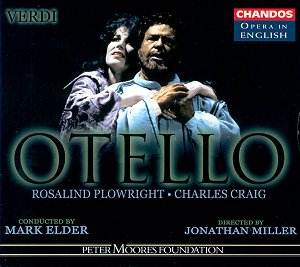Chandos’s efforts to reintroduce recordings from the
EMI archives of performances of opera in English can only be applauded
(this Otello was originally on HMV SLS 1436063). Of course, the
major and supreme item in this series has to be the Goodall ‘Ring’,
but there is much to celebrate in Mark Elder’s Otello, not least
the resplendent Rosalind Plowright (who takes the role of Desdemona).
Andrew Porter’s excellent translation is used here,
and as always from this source it is sensitive and natural. For a performance
to convince, though, the hand on the teller is of supreme importance,
and all credit must go to Mark Elder, who ensures that a secure and
cogent dramatic thread runs through the whole experience. From the opening
chord (which itself speaks volumes about the recording: clear and upfront)
the dynamism of the reading is established, while the choral contributions
vividly evoke a live performance at the Coliseum. Later, the sometimes
almost Mozartian transparency of texture displays an intimate knowledge
of the score. Elder’s pacing of Acts 3 and 4, in particular, is faultless.
Rosalind Plowright sings with an amazing balance of
beauty of tone and musicianship. Her portrayal of a broken woman in
Act 3 Scene 8 is as successful as it is touching. The real ensemble
work of this scene, a positive trait which characterises the entire
performance, concurrently exemplifies the real strength of regular singers
at the same opera house. Technically, Plowright could hardly be bettered
(and I measure her against Desdemonas in any language). She is superb
in Act I’s Love Duet, conveying a real sense of longing in her recollections
Neil Howlett as Iago joins Plowright as the other vocal
reason for purchasing this set. Iago’s ‘Credo’ is as clear a statement
of his twisted philosophies as can be found, and this is a highlight
of Howlett’s reading of the part. Iago is indeed a rewarding part and
if the casting is not carefully considered, the danger is that Iago
will put his Otello in the shade. And that is, to an extent, what happens
here. Charles Craig’s reading of the cruelly taxing title role is the
major weak link here. When one compares, for example, Otello’s initial
cry of ‘Esultate!’ (here ‘O rejoice now’) to Domingo’s almost super-human
entry for Chung (DG 439 805-2) the difference, in microcosm, becomes
clear. Here is Otello, fresh from his victory, preternaturally swelled
with confidence. Craig is merely an ENO principal (albeit a good one)
taking the part: Domingo is Otello, imposing, awe-inspiring.
Perhaps the comparison is a little harsh, but it serves to highlight
the down side of Craig’s reading.
It would not do to suggest he is a disaster: it is
just that in comparison to his immediate ENO colleagues (particularly
Plowright) he can disappoint. He still, however, manages to convey fury
and jealousy in Act 1 Scene 5 as Iago stokes the fires of doubt and
he interacts well with Desdemona in Act 3 Scene 1 (which centres on
the significance of the all-important handkerchief).
Of the smaller roles, even Gordon Traynor’s Herald
stands out as he brings word that the Cypriot ambassadors have been
sighted. Stuart Kale’s excellent Rodrigo is truly conspiratorial with
Iago in Act 1.
Theatrically, everything gels in the final act, from
Elder’s elucidation of Verdi’s extraordinary scoring to Plowright’s
rising to Verdi’s operatic challenges. Plowright gives a rapt and intense
Ave Maria and the high strings play as if inspired by her achievement.
The third scene, which follows on immediately, is notable for the orchestra’s
ability to paint in sound. Over the years, the English National Opera
Orchestra has always struck me as London’s equivalent to the Hallé
Orchestra: inspired by a good conductor, they can play like gods; put
a third-rate conductor in from of them, they play like a local youth
orchestra. Their excellence in this Otello is a tribute to the
faultless musicianship of Mark Elder.
Having heard this set, I would not willingly be without
it. Certainly, it complements the dynamic Chung/Domingo on DG mentioned
above, and Leinsdorf's excellent account (with Vickers as Otello and
Leonie Rysanek as Desdemona on RCA Living Stereo 09026 63180-2). If
you haven’t guessed already, this set comes as highly recommended.
Colin Clarke

![]() Charles Craig (tenor) Otello;
Rosalind Plowright (soprano) Desdemona; Neil Howlett (baritone) Iago;
Bonaventura Bottone (tenor) Cassio; Stuart Kale (tenor) Rodrigo; Shelagh
Squires (mezzo) Emilia; Sean Rea (bass) Lodovico; Malcolm Rivers (baritone)
Montano; Gordon Taylor (baritone) Herald; Chorus and Orchestra of English
National Opera/Mark Elder.
Charles Craig (tenor) Otello;
Rosalind Plowright (soprano) Desdemona; Neil Howlett (baritone) Iago;
Bonaventura Bottone (tenor) Cassio; Stuart Kale (tenor) Rodrigo; Shelagh
Squires (mezzo) Emilia; Sean Rea (bass) Lodovico; Malcolm Rivers (baritone)
Montano; Gordon Taylor (baritone) Herald; Chorus and Orchestra of English
National Opera/Mark Elder. ![]() CHANDOS OPERA IN ENGLISH
CHAN3068 [138.06] [CC]
CHANDOS OPERA IN ENGLISH
CHAN3068 [138.06] [CC]